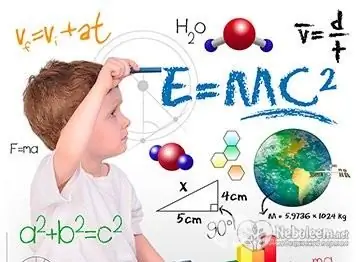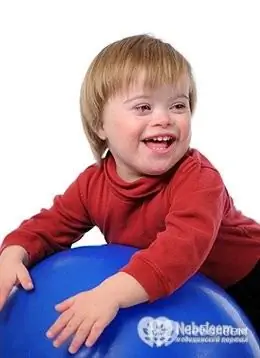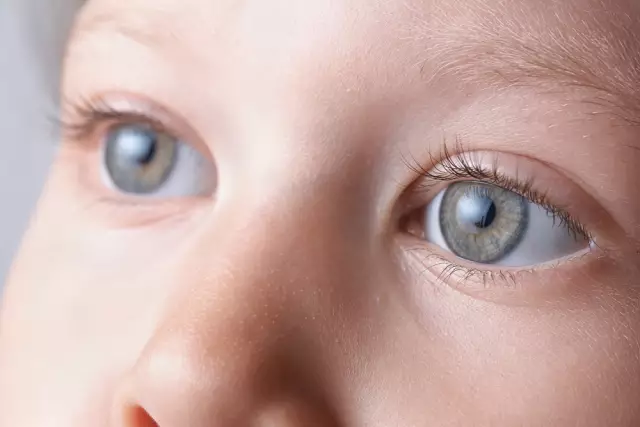- Author Rachel Wainwright wainwright@abchealthonline.com.
- Public 2023-12-15 07:39.
- Last modified 2025-11-02 20:14.
Intellectual impairment in children
The impairment of intelligence in children is characterized by doctors as mental retardation caused by organic lesions of the central nervous system of different severity and localization. Children with such disorders, depending on the degree of manifestation of the symptoms of the disease, need additional care from parents and specialists who can facilitate the child's subsequent adaptation to life in society.
Characteristics of children with intellectual disabilities

One of the main characteristics of children with intellectual disabilities is a persistent decrease in activity aimed at learning about the world. According to the degree of mental retardation and the ability to learn, doctors divide such deviations into:
- Idiocy, which is the deepest degree of mental retardation and is characterized by severe disorders of coordination of movements, motor skills and orientation in space, which in some cases forces them to a recumbent lifestyle. With such a violation of the intellect, it is very difficult for children to form even elementary hygienic skills of self-service. Comprehension of the surrounding world is practically inaccessible to them, and speech either does not develop at all, or is developed in a limited way;
- Imbecility, which is characterized as a milder impairment of intelligence in children compared to idiocy. These children have a higher chance of mastering speech and learning simple work skills;
- Debility, which is considered the mildest course of the disease. The peculiarities of children with intellectual disabilities of this form do not allow them to study in ordinary schools due to a reduced level of mental abilities and the specifics of the emotional-volitional sphere. Difficulties in training and education are associated with the underdevelopment of the analytic-synthetic functions of higher nervous activity. Weakened health, somatic disorders and features of the system of incentives significantly limit the range of their future professional and labor activities.
In addition, a separate group of children with mental retardation is distinguished. In this case, a feature of children with intellectual disabilities is significant difficulties in studying the subjects of the curriculum of an elementary general education school. Such children cannot be classified as mentally retarded, since they have a sufficient ability to communicate and a wide zone of proximal development. The causes of mental retardation can be different. Allocate mental and psychophysical infantilism associated with:
- Harmful effects on the central nervous system during pregnancy;
- The influence of various factors that led at an early age to cerebrasthenic and asthenic states of the body.
In some cases, such children with intellectual disabilities can study in general education schools. However, if severe cerebrasthenic disorders predominate in the disorders, they need both therapeutic measures and psychological and pedagogical correction.
Depending on the reasons that led to the development of violations, and the time of exposure to harmful factors, doctors distinguish many options for deviations in cognitive activity and the emotional-volitional sphere. The following features are common to all types of mental retardation:
- Immaturity and underdevelopment of emotions;
- Lack of intellectual skills, as well as inability to obtain the knowledge necessary for such work;
- Low efficiency arising from increased exhaustion;
- Small vocabulary;
- Difficulties of verbal-logical operations, which cause difficulties when it is necessary to solve visual-effective tasks;
- An extremely narrowed view of the world around;
- Inability to use play activities for development;
- Delayed perception of current events;
- Low level of self-control, which affects not only learning, but also in life situations.
Teaching children with intellectual disabilities

When teaching children with intellectual disabilities, as well as for their social adaptation, preschool institutions and schools use the methods of special pedagogy - oligophrenopedagogy.
Children with the most profound degree of mental retardation - idiocy, are not subject to training and in most cases, with the consent of their parents, are in special institutions where they are provided with the necessary care and medical assistance. Upon reaching adulthood, they are transferred to special boarding schools for chronic patients.
Children with intellectual disabilities, characterized as imbecility, are practically not taught even in an auxiliary school due to deep defects in perception, memory, motor skills, thinking, communicative speech and the emotional-volitional sphere. Until they reach adulthood, children with these disabilities in most cases are in special orphanages, where they receive the simplest skills of writing, reading and counting and some simple labor operations according to programs specially designed for such children. This opens up the prospect for them to work in the future in specially organized workshops.
Teaching children with intellectual disabilities in the form of debility should take place in special institutions according to programs that allow them to master written and oral speech, numeracy skills, and the concept of number. Difficulties in learning are associated with the fact that such children experience difficulties in understanding the connections between sounds and letters, sets and their numerical expressions, the inability to establish and understand temporal, spatial and cause-and-effect relationships between objects and phenomena.
Impairment of intelligence in children in the form of developmental delay usually manifests itself in the difficulties of the formation of basic mental operations - synthesis, analysis, comparison and generalization. In addition, the inability to plan their activities and other peculiarities typical for such children create certain difficulties when studying in general education schools.
Due to the stable lag in most subjects and ridicule from peers, such children develop a negative attitude towards the learning process and quite often trauma of the psyche is observed. For this reason, it is more humane for such children to be taught in primary school in special educational institutions. In most cases, with the right approach, it becomes possible to lay the necessary knowledge and instill learning skills, which allows them to be transferred to a regular school in the future.
Children with intellectual disabilities require an integrated approach from both doctors and teachers. Since any human life is priceless, it is necessary to use every opportunity so that a child with such disabilities can maximize his existing abilities and adapt more easily to adult life.
Found a mistake in the text? Select it and press Ctrl + Enter.






